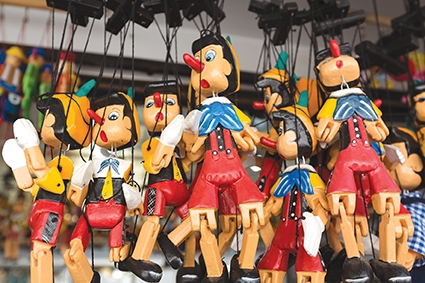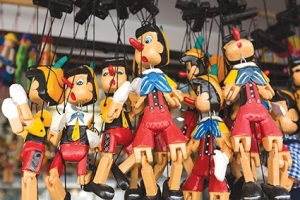An Excess of Political Product in Georgia
OPED
I don’t know how much the world has come to know Georgia as a new independent nation in the wake of the clamorous soviet collapse a while back, but before this ‘Geopolitical Catastrophe,’ we were identified as Russians, which made us angry and miserable because national identity has always meant something painfully important to us Georgians.
Today, we are open to the world in the full sense of our national freedom and independence, although still fragile and fledgling. And the world is learning little by little who we are and where we are coming from. The world has already learnt that we love abundance. Suffice to say that our sumptuous festive tables with layers of food, wine pouring from jugs like rivers and numerous toasts in a prolonged and exhausting process of eating and drinking have become a part of our everyday lifestyle. Even the youth who have had a chance to taste and adopt the western table manners and habits would cling to those overwhelming traditions of deep roots all over Georgia. Even the kids whose moms and dads are celebrating birthdays for them, would elect a toastmaster, called ‘Tamada,’ to lead the table with traditional wordy toasts. Abundance is all over the place – abundance in everything.
We are only forgetting here one considerable field of activity where abundance is even more striking than in other walks of life. Politics! I don’t think there is another country in the world with a multitude of political parties comparable to ours. Georgia has more than 200 officially registered political parties who claim participation in the political game. Although their actual clout on our life varies from none to very little, they still want to be registered and desperately try to be functional to some notable extent. This is a real mania, but this is our nature – we want to be in politics, head over heels.
As curious as this political phenomenon seems to be, it must have some socio-psychological grounds. Why should we be so terribly preoccupied with what is called politics? Is this a malady? Could it be a national hobby? Some freaky infatuation? Inflated love for politicking? Attempt to survive? Desire for popularity? For a better life?
It is well known that Americans are rationalists and pragmatic thinkers, if not doers, and they have made a historical choice to let only two parties build the political process in the country, formally admitting to table one more party, commonly called Independent. America, with 400 million people, has only two major and about 40 minor political parties, Four-million strong Georgia has about 10 major and 220 minor ones. Isn’t this something? Thank God not all of them are participating in the elections. Just imagine hundreds of political parties in the electoral marathon in our miniature Georgia. That would be the laugh of the century. Even if only 10-15 parties show up and win enough votes to get through, it will still create a gruesome overall impression, and also, the due predicament in the parliament if all of them get into it by hook or by crook.
On the other hand, the political showground might become the next comedy show, what with the regular fist fights likely to become the part with the highest ratings, leaving the verbal altercations and vilifications far behind.
On a more serious note, questions coming to mind include, why are we so badly obsessed with politics and politicians and their parties? Could the reason be our public opinion that our quality of life is in their hands? Or could it be the expectation that politicians and their parties might change something to the better so that we can finally relax a little?
Do we seriously think that politicians are the people they try to make us believe they are – caring, loving, laborious, intelligent, faithful and patriotic? Do we really think that this hilarious abundance of political parties makes any sense in this nation’s life? Such an abundance of political parties and hundreds of thousands of citizens, clad in the hides of political animals, perpetuate the ever-present political hysteria in Georgia which only uses up our money, time and energy with no tangible result to count on.
The most central of all questions, how come we have this much time to spend on politics? If there are 220 political parties to constitute our ideological infrastructure, then presumably all of them have the followers. Multiply the number of parties by the average number of their adherents and you will get a figure which goes beyond any understanding of participation of the public in a political process.
When are we working on our economy, if we are doing so at all? How do we manage to create the material strength for the survival of our families? For how long are we going to be buried in political fuss, farce and vanity? It is the weird and permanently growing abundance of political parties that yields fruitless verbiage and gets us nowhere. It is the irrelevance of the good-for-nothing political groupings and associations that make our wits blunt and immobile. We need hands, not parties, in abundance. Working hands! We don’t need to talk this much, we need to be doing. The first and foremost thing that our Western friends prompt us for – not demand from us, though – is to learn how to labor with a maximum result in a minimum amount of time. Political parties cannot do this. They can only talk, and very often, only up to a point. Then why such an abundance of a product we can’t use or sell?
Nugzar B. Ruhadze












